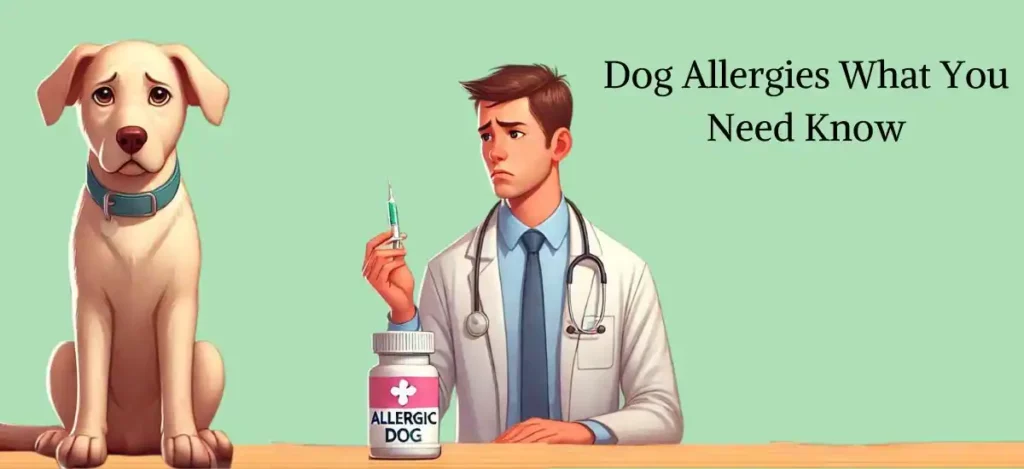Dog allergies are more common than you might think, affecting countless canines across the globe. Just like humans, dogs can show allergic symptoms when exposed to substances that don’t bother most others. This guide walks you through the basics, helping you spot the signs and understand what might be triggering your furry friend’s discomfort. Let’s dive in and clear the air on dog allergies!
Types of Dog Allergies
Understanding the different types of allergies can help you better manage your dog’s health. Here’s what you need to know:
- Environmental Allergies: These occur when dogs react to airborne allergens like pollen, dust, or mold. Symptoms can include itchy skin and sneezing.
- Food Allergies: Some dogs develop allergies to specific ingredients in their food, such as chicken, beef, or grains. Look out for gastrointestinal upset or skin rashes as telltale signs.
- Contact Allergies: Less common but still troublesome, contact allergies arise from a dog’s skin reacting to everyday materials like nylon collars, plastic food dishes, or certain shampoos.
- Flea Allergy Dermatitis: A single flea bite can cause severe itching and irritation for a dog allergic to flea saliva, often leading to excessive scratching and hair loss.
Signs and Symptoms of Dog Allergies
Recognizing the signs of allergies in your dog is the first step to providing relief. Here are some symptoms to watch for:
- Skin Issues: Redness, bumps, and excessive scratching can indicate an allergic reaction.
- Gastrointestinal Problems: Frequent vomiting or diarrhea can sometimes be linked to food allergies.
- Respiratory Distress: While less common, some dogs may exhibit coughing, wheezing, or other respiratory symptoms in response to airborne allergens.
Understanding these symptoms can help you seek timely treatment and possibly identify the source of the allergy, setting the stage for better management and comfort for your dog.
Diagnosing Dog Allergies
Identifying the exact cause of your dog’s allergies can be challenging but crucial. Here’s how veterinarians typically diagnose allergies in dogs:
- Elimination Diet: For food allergies, vets often recommend an elimination diet, where your dog is fed a limited ingredient diet to isolate the allergen.
- Skin Tests: Similar to allergy testing in humans, skin tests can identify environmental allergies by observing reactions to small amounts of common allergens.
- Blood Tests: These can help detect the presence of allergen-specific antibodies in your dog’s blood, useful for diagnosing both environmental and food allergies.
Prompt and accurate diagnosis can lead to more effective management of your dog’s allergies, improving their quality of life.
Treatment Options for Dog Allergies
Once allergies are diagnosed, treatment can greatly alleviate your dog’s discomfort. Here are common treatment strategies:
- Medications: Antihistamines, corticosteroids, and immune-modulating drugs are often prescribed to reduce symptoms.
- Natural Remedies: Supplements like omega-3 fatty acids, probiotics, and coconut oil can support skin health and reduce allergic reactions.
- Dietary Adjustments: Switching to hypoallergenic dog food or a home-cooked diet as prescribed during the elimination diet phase.
These treatments, combined with regular veterinary oversight, can help manage the symptoms effectively.
Managing Environmental Allergies
Environmental allergies can be persistent and frustrating to control. Here’s how to manage your dog’s environment to minimize allergen exposure:
- Regular Cleaning: Vacuum and clean floors and surfaces regularly to remove dust and allergens.
- Air Purification: Use air purifiers to reduce airborne allergens like pollen and dander in your home.
- Bathing and Grooming: Frequent baths and grooming can help remove allergens from your dog’s coat, providing relief from skin irritation.
By adjusting your home environment and routine, you can help reduce the frequency and severity of your dog’s allergic reactions.
Preventing Allergies in Dogs
While not all allergies can be prevented, there are steps you can take to reduce the likelihood of allergic reactions in your dog:
- Early Exposure: Introducing a variety of foods and environmental stimuli at a young age may help reduce sensitivities later in life.
- Diet Quality: Feeding your dog a high-quality, balanced diet rich in essential nutrients can strengthen their immune system and potentially ward off allergic reactions.
- Regular Check-Ups: Regular veterinary visits can help catch and address potential allergic reactions before they become severe.
Implementing these preventive measures can help ensure your dog leads a healthier, more comfortable life.
When to Consult a Veterinarian
Knowing when to seek professional help is crucial for effectively managing your dog’s allergies. Here are some signs that it’s time to consult your veterinarian:
- Persistent Symptoms: If your dog’s allergy symptoms do not improve with initial treatment or continue to recur, a vet visit is necessary.
- Severe Reactions: Symptoms like extreme swelling, difficulty breathing, or significant changes in behavior warrant immediate veterinary attention.
- Routine Management: Regular check-ups can help adjust allergy management plans as your dog ages or if their environment changes.
A veterinarian can offer more specialized treatments and advice, providing the best care possible tailored to your dog’s specific needs.
Frequently Asked Questions
Q1. What are the most common allergens for dogs?
Ans: The most common allergens for dogs include pollen, dust mites, mold, flea saliva, certain foods (like beef, chicken, and dairy), and various fabrics or cleaning products.
Q2. How can I tell if my dog’s symptoms are due to allergies or something else?
Ans: Differentiate allergies from other conditions by noting if symptoms like itching, red skin, or gastrointestinal issues improve with allergen avoidance or targeted treatment. Persistent or recurring symptoms typically indicate allergies.
Q3. Can dog allergies be cured or only managed?
Ans: Most dog allergies cannot be cured and require ongoing management to control symptoms. This includes environmental modifications, dietary adjustments, and possibly medication.
Conclusion
Understanding and managing dog allergies requires patience and attentiveness. By recognizing the signs, obtaining an accurate diagnosis, and following through with appropriate treatment and preventive measures, you can greatly enhance your dog’s comfort and quality of life. Remember, working closely with your vet is crucial to successfully managing allergies and ensuring your furry friend remains happy and healthy.

